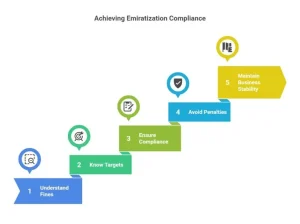The UAE government introduced the driving force of creating more job opportunities for nationals. This ultimately reduces the reliance on professionals living across borders. Emiratization opens the door for national talent and encourages them to get on board. However, the rules for this program are not one-size-fits-all. The Targets change depending on your sector and emirate, and if you’re running a private sector company on the mainland, you should definitely get the pressure.
The consequences of not fulfilling the target or simply taking it for granted are severe. The Emiratization fines in the UAE are surely ready to catch you. It may restrict your business, losing government contracts, and in extreme cases, even license suspension by MOHRE. And no business owner wants this.
To keep you on the safe side, this guide is your rescue. Understand what Emiratization fines actually work in 2026 and what the penalties look like. Learn how your business can stay compliant without losing sleep or profit. Think of it as your shortcut to playing by the rules and keeping your business future-proof in the UAE.
What Are Emiratization Fines?
When companies in the UAE fail to meet the required targets for hiring Emirati nationals, they end up facing penalties, which are Emiratization fines, to be exact. These fines are enforced by the Ministry of Human Resources and Emiratisation MOHRE under Federal Law No. 33 of 2021. Compliance is a legal obligation for many businesses.
Remember that these fines mainly affect private sector companies on the mainland. Government entities and free zone companies are usually not subject to the same rules, unless specific regulations state otherwise. The reason behind this program is simple: to increase employment opportunities for UAE nationals, reduce reliance on expatriate workers, and build a strong, sustainable local workforce.
To keep things fair and consistent, MOHRE has set clear quotas for the number of Emiratis that businesses must employ. If a company falls short of these quotas, fines are imposed. This system pushes organizations to contribute to the UAE’s long-term vision of empowering its citizens and strengthening the economy.
How Do Emiratization Fines Affect Private Sector Businesses?
Emiratization fines are designed to encourage and push companies to reach their target of hiring Emiratis. MOHRE takes care of Emiratization compliance regularly. This way, they check whether quotas are being met or missed.
Non-compliance goes far beyond just paying a fine. It can affect a company’s ability to win government contracts, renew licenses, or even apply for new ones. Over time, if businesses continue to ignore the rules, the penalties escalate. This can include higher fines, strict restrictions, and eventually even license suspension or non-renewal.
In short, failing to comply doesn’t just hurt a company financially; it damages credibility, limits growth opportunities, and puts long-term business stability at risk. Staying compliant isn’t just about avoiding penalties; it’s about keeping your business in good standing in one of the most competitive markets in the region.

Key Factors Determining Emiratization Fines
MOHRE issues penalties for the companies that fail to meet the same Emiratization requirements. Here’s what really determines how fines are applied:
Sector-specific quotas
MOHRE publishes emiratization targets for different industries, and they’re not identical. For example, the banking, healthcare, and education sectors usually have higher quotas than others because they’re critical to national development.
Compliance history
Businesses that consistently fall short of their targets face steeper penalties, while those that show effort or improve over time may be treated less harshly. The longer a company stays non-compliant, the tougher the consequences become.
Company size
Bigger companies are expected to hire more Emiratis. If they fail to meet the required quota, the fines are naturally higher than what a smaller firm would face. The logic is simple: the larger the workforce, the greater the responsibility to contribute to the national employment plan.
Emirate-specific enforcement
While Emiratization is a federal policy, the strictness of enforcement can differ from one emirate to another. For instance, in places like Abu Dhabi and Dubai, regulators may adopt stricter measures compared to smaller emirates.
Understanding the Emiratization Quotas in the UAE
Companies are required to fulfill a minimum percentage of hiring UAE nationals each year. This is the Emiratisation quota, which is predetermined.
Depending on the sector, business size, and jurisdiction, these quotas vary across the board. For example, industries like banking, healthcare, and education often have stricter targets compared to other sectors because of their importance to the country’s growth.
Also, Quotas can differ between mainland companies and free zone entities, with the stricter enforcement usually applying to mainland businesses. On top of that, the requirements are not set in stone; they’re updated annually to align with the UAE’s workforce goals.
This is why every company should always refer to the official MOHRE website for the most up-to-date, sector-specific quota requirements.
How to Calculate Your Emiratization Quota:
| Company Size | Minimum Emirati Employees Required |
| Small businesses (1-50 employees) | 1-2 Emirati employees |
| Medium businesses (51-100 employees) | 3-5 Emirati employees |
| Large businesses (100+ employees) | 6+ Emirati employees |
Take these figures as just examples. Specific quotas can differ depending on the business sector. It is crucial for companies to regularly check for updates from the Ministry of Human Resources and Emiratisation (MOHRE).
Common Emiratization Fines in the UAE and How to Avoid Them
The amount of Emiratization fines depends on your sector, emirate, and level of compliance.
For example, in Dubai, fines can start from around AED 3,000 to AED 6,000 per unfilled Emirati position per month, while in other emirates or sectors, the range may differ.
Here are the most common penalties companies face:
- Escalating penalties: Repeated non-compliance doesn’t just mean bigger fines; it can eventually lead to suspension or even revocation of trade licenses.
- Monetary fines: Businesses are fined monthly for every Emirati position left unfilled. The longer the non-compliance continues, the higher the financial impact.
- Government contract bans: Non-compliant companies are automatically barred from government contracts, tenders, and certain permits, cutting off major growth opportunities.
- Quota shortfalls: If a company misses its annual Emiratization target, it will be fined for each unfilled position as per MOHRE regulations.
Companies need a solid compliance strategy to avoid these penalties. Plan, actively recruit Emirati talent, and focus on retention. This not only saves businesses from fines but also strengthens their standing in the UAE’s competitive market.
Steps to Avoid Emiratization Fines
Stay away from Emiratisation fines, but you need an effective strategy. Here are some practical steps businesses can take:
- Register with the Nafis program via MOHRE to access financial incentives, subsidies, and training support for Emirati employees.
- Partner with specialized Emirati recruitment agencies to tap into dedicated talent pools and boost your chances of meeting sector-specific quotas.
- Set up internal compliance tracking systems to regularly monitor hiring, retention, and overall progress against MOHRE quotas.
- Prioritize Emirati candidates in your recruitment process and build strong retention strategies to keep them engaged long-term.
The Benefits of Emiratization Compliance
If the company sincerely follows regulations, the rewards are even greater for compliance. Companies that meet their targets not only avoid penalties but also unlock a range of advantages that strengthen their business:
Financial incentives through Nafis
When businesses hire and train Emirati nationals, they get the benefits of government fee reductions, tax incentives, and even salary subsidies.
Access to government contracts and tenders
The UAE government offers contracts for the Compliant firms, providing them valuable opportunity to stay ahead in the UAE market.
Priority in licensing and visa processing
Staying compliant firms for the companies means faster approvals for trade licenses, renewals, and employee visas.
Boosted Employee Morale
The workforce that actively integrates UAE nationals is diverse and inclusive. Emiratis can create a stronger sense of purpose and loyalty within the organization.
Enhanced corporate reputation
Meeting Emiratization goals positions your business as a responsible and forward-thinking organization, improving credibility with clients, partners, and regulators.
The Role of Emiratization Nafis in Supporting Compliance
Making national workforce integration smooth, the Emiratization Nafis stands as a trusted partner for businesses. Nafis provides the framework, resources, and incentives that make compliance with Emiratization policies easier and more practical.
Nafis acts as a bridge between employers and skilled Emirati professionals. The team ensures companies not only meet mandatory hiring targets but also gain long-term value from a sustainable local workforce. By positioning itself as a compliance enabler, Emiratization Nafis supports organizations in aligning with government regulations while strengthening their reputation as contributors to the UAE’s economic vision.
By partnering with Nafis via the official MOHRE platform, businesses gain:
- Expert guidance on structuring Emirati hiring processes.
- Access to a large pool of qualified Emirati candidates.
- Regular updates on Emiratization regulations and practical ways to stay compliant.
In short, partnering with Emiratization Nafis not only helps companies avoid fines but also unlocks financial incentives, operational benefits, and a stronger reputation in the UAE market.
How Emiratization Fines Impact Private Firms in Dubai
Private companies in Dubai are obliged to follow legal regulations. The program demands that firms recruit Emirati employees and fulfill the annual quota effectively.
In case of non-compliance, the company might face severe consequences that affect its operations. This includes suspension of trade licenses, restrictions on operations, and exclusion from government contracts and tenders.
Hence, keep up with the MOHRE updates if your company is based in Dubai. Compliance here is more than just avoiding penalties. It’s about protecting your business opportunities in one of the most competitive markets in the UAE
Partner with Emiratization Nafis to Ensure Compliance
Emiratisation is a top priority of the UAE government. They put special emphasis on private firms to follow this program by actively onboarding national professionals. In case of not fulfilling quotas, the company has to suffer from facing multiple fines and severe consequences. That’s why proactive compliance is the only smart approach for businesses that want to thrive in the UAE market.
You can always partner with a reliable consultant like Emiratization Nafis. Offering businesses tailored guidance, the team provides hands-on support to meet targets and avoid penalties. Moreover. We encourage you to contribute meaningfully to the UAE national employment.
With the right strategy and the support of Nafis, your business can confidently navigate the Emiratization landscape. Unlock exclusive incentives, create a workplace that empowers UAE nationals, and secure your own long-term success.
FAQs for Emiratization Fines
Q1: What are the fines imposed for failing to meet Emiratisation quotas?
Companies pay monthly penalties. It starts from 3,000 to 6,000 in Dirhams per unfilled Emirati role. It depends on the sector and emirate.
Q2: How do fines escalate if Emiratis are not employed?
Fines rise monthly for each unfilled role. Lengthy non-compliance can result in steeper penalties. This led to government contract bans and suspension of trade licenses.
Q3: Are there legal consequences beyond fines?
Companies risk losing government contracts. They may face licensing delays. In severe cases, license suspension or non-renewal may also occur.
Q4: Can fines vary depending on company size or sector?
Larger firms and critical industries face higher quotas. Their fines are bigger compared to those of smaller/less regulated businesses.
Q5: How can organizations skip penalties?
Businesses should stay proactive. This helps them to avoid penalties. They recruit Emiratis through Nafis. They track compliance and build strong retention plans. Quick action saves money and secures many business opportunities.



